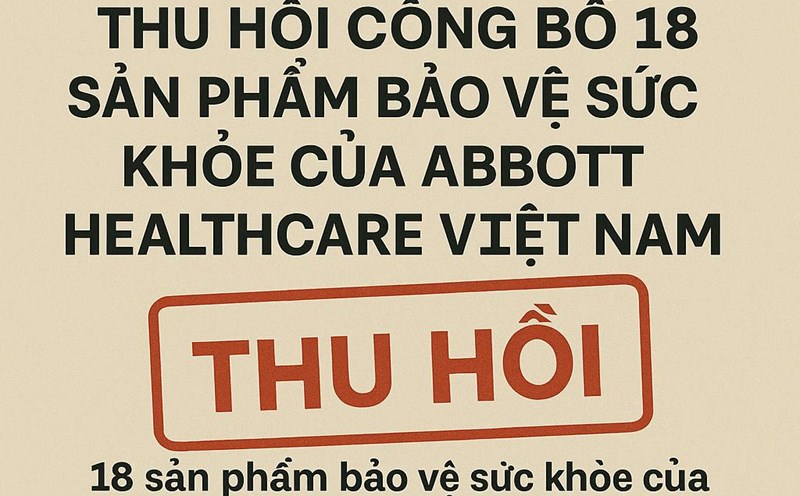Continuously recalling violating food
According to the Ministry of Health, from 2021 to now, the market has recorded more than 84,000 conventional food products and 54,549 functional food products. Of which, 80.4% is domestically produced goods from 201 establishments.
Management focuses on controlling the safety of microorganisms, heavy metals and preventing banned substances through pre-inspection and post-inspection. With the strong development of the market, especially on e-commerce platforms, tightening post-inspection and comprehensive control of food quality is an urgent requirement.
Recently, the Food Safety Department has continuously issued decisions to revoke the effectiveness of health protection food products (TPBVSK). On May 12, the Department revoked the validity of the Declaration Receipt Certificate for 18 TPBVSK of Abbott Healthcare Vietnam Co., Ltd. at the request of the enterprise. Previously, on May 6, three products of Ha Vy Trading Services Company Limited were also revoked due to not meeting food safety regulations. On April 26, six products of New Photo Company Limited continued to be recalled.
The common reason for the revocation is that businesses voluntarily request to withdraw documents, products that do not meet safety standards, or production at facilities that do not ensure conditions.
Low recall rate, counterfeit goods are rampant
Dr. Nguyen Hung Long - Deputy Director of the Department of Food Safety (Ministry of Health) - said that the situation of production and trading of fake food, especially TPBVSK, is complicated and tends to increase. Counterfeit goods are often sophisticatedly produced, making it difficult to distinguish them from real goods, distributed through social networks, e-commerce platforms and retail channels.
The Department has discovered many violations through post-inspections, including products circulating without being announced, counterfeit labels, fake origins and not ensuring quality. Some serious cases have been transferred to the investigation agency.
The main reason is that the profit from functional food trading is high, while the production cost is low. The current legal system is still stuck when allowing businesses to self-declare products (except for three special groups), making management difficult.
Fraudulent activities, smuggling and the production of counterfeit food are taking place with increasingly sophisticated organizations and tricks. Meanwhile, the post-inspection force is still thin, with limited funding, especially in controlling goods via e-commerce and "hand-carried goods". The handling of violations is not commensurate with reality.
Proposal to tighten legal regulations
Dr. Tran Viet Nga - Director of the Department of Food Safety (Ministry of Health) - admitted that the management of fake food is facing many difficulties due to the loose mechanism. The current Decree 15/2018/ND-CP allows businesses to self-declare and take responsibility, but in many cases, they have taken advantage to "circumvent the law", launching products that are not in their nature, easily causing confusion and violating regulations.
According to current regulations, businesses only need to self-declare, do not have to appraise documents, simple procedures and do not charge fees. As a result, many products are announced but are not in accordance with actual production. Meanwhile, post-inspection is limited due to lack of human resources and funding, high testing costs, causing difficulties for localities.
Currently, the Food Safety Department is proposing to amend Decree 15 in the direction of tightening the self-declaration process, and at the same time recommending that localities increase investment in post-inspection work.
To ensure people have access to safe food, synchronous coordination is needed. Enterprises must comply with the law and put business ethics first. Management agencies need to improve legality and strengthen inspection. consumers need to proactively equip themselves with knowledge to choose safe products" - Dr. Tran Viet Nga emphasized.











